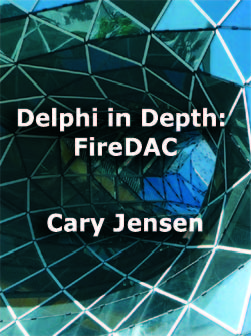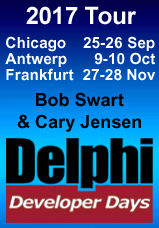It’s less than a month away from the first city in the 2010 Delphi Developer Days tour, and I thought this might be a good time to share some history and insight into this event. To begin with, Delphi Developer Days is an intense, two-day Delphi event featuring me and Marco Cantù. Our first city on this tour is Baltimore/Washington DC (May 11-12), continuing on to Chicago (May 14-15), Los Angeles (May 17-18), London, England (May 26-27); and finishing up in Frankfurt, Germany (May 30 – June 1).
Marco and I have known each other for a long time, are good friends, and have been looking for an opportunity to work together. In May of 2008 we talked about the lack of a live Delphi event in the US, and thought that this provided us an opportunity to offer something unique.
We weren’t interested in trying to run a conference similar to the past annual Borland Conferences or DelphiLive!. Instead, we were looking to offer something similar to a traditional training, but with the interaction and networking that a somewhat larger event can provide. As a result, we limit attendance to around 30 attendees in each city. This gives us a chance to interact with each attendee, while maintaining a critical mass for networking. (In addition to our consultant and development services, we’re both seasoned Delphi trainers.)
But there were a number of challenges that we knew we’d have to address in order for the event to be successful. To begin with, Delphi is a mature product. While there are always some newcomers, most Delphi developers have been using it for some time. Furthermore, not everyone is using the latest versions of Delphi. In fact, by some estimates, nearly half of all active Delphi developers are using Delphi 7 or earlier.
Another challenge is that there are a lot of different types of Delphi developers. Many are engaged in traditional client/server database development, while others are building server-side applications that operate over the Internet. How do you offer something that will appeal to such a diverse group of developers?
Honestly, I think the solution we came up with is the right one. To begin with, we embrace the richness of the Delphi community. We include timely topics about the latest versions of Delphi. Even if you are working with an older version, these topics are relevant. Specifically, even if you are not ready to upgrade now, you want to be informed about what the latest versions can do for you and your development efforts. In the long run, unless your applications are all at the end of their lifecycle, you will upgrade sooner or later.
At the same time, we realize that there is always room for fundamentals, topics that apply to many versions of Delphi (and some of these go all the way back to Delphi 1!). As far as types of applications, we understand that we need to have a healthy dose of both Windows client development as well as distributed computing.
Finally, we wanted to deliver this type of content in a way that would be fun for us as well as our attendees, and do so in a way that gives the attendees something of value, something that lasts well beyond the two days we spend together.
All of these considerations went into the format of Delphi Developer Days. There are a total of 12 presentations over the course of two days, four of which Marco and I do together, and eight which we do individually (four sessions where we each present simultaneously in separate rooms). In choosing the topics, we tried to include something for everybody, from “What’s New in Delphi and Delphi Prism,” to “Leveraging ClientDataSets.” From “Internet Delphi Application Technologies Compared,” to “Delphi Development for Windows 7.” We even include a foundation presentation on “Designing Interfaces and Objects.” (For a complete schedule, visit http://www.delphideveloperdays.com/descriptions.html.)
When Marco and I are presenting separately, attendees can attend either talk. But what if you are interested in both topics? While we tried to keep the simultaneous individual session topics from overlapping, we acknowledge that this is an issue. Fortunately, both Marco and I are authors, and have published close to 40 books between us. To put this another way, we know how to write, and like doing it.
Each attendee to Delphi Developer Days receives a course book written by us that includes a paper for each talk. So, if you choose to attend one individual session, you can read the paper for the other session that is going on at the same time. Last year our course book was 500 pages in length (you get our slideshows and code, too, but these papers are detailed papers, covering more information than we have time for in our live sessions). We are currently writing the course book for this year’s event, and I’m guessing that it will be similar in length.
This is a course book that you can’t get anywhere else. While there is occasional overlap with other writings that we’ve done (such as our blogs, books, magazine articles, or other courseware), we do not publish or otherwise make this material available outside of Delphi Developer Days. Sorry, please don’t ask to buy the course book; it’s for attendees only.
As I mentioned above, this is not the first time Marco and I have done this. Delphi Developer Days 2009 was a wonderful success. Marco and I had a blast, and the feedback we received encouraged us to do it again this year, with two additional cities added to the tour.
So how does this year’s tour compare to last year’s? In addition to adding two cities (Los Angeles and Frankfurt, Germany, cities added in response to requests from the Delphi community), we added new topics and brought back some of the popular ones. And in order to make this year’s event relevant for previous attendees, we made sure that when a previous topics was covered during our breakout sessions, it was paired with a new topic, giving previous attendees a choice of something new. And, judging from the number of last year’s attendees who have registered for this year, we succeeded.
I would be remiss if I didn’t also mention our sponsors. Embarcadero Technologies and Sybase are once again our platinum sponsors, and each city will include a short presentation by representatives of one or both of these companies. In addition, we have more than 20 additional sponsors from almost every segment of the Delphi community. Many of these sponsors offer tools that work with Delphi, and many of them have provided copies of their products as door prizes for attendees. These sponsors are among the most active companies in the Delphi community, and we encourage you to visit their sites and learn more about their products. You will find a list of our current sponsors at http://www.delphideveloperdays.com/sponsors.html.
But there is more. On the first night of each US city, either Anders Ohlsson or David I (David Intersimone) will be present to provide a two hour “Embarcadero Delphi Evening,” complete with loads of information about upcoming plans. (Anders will be in Baltimore/Washington DC and Chicago, David I in Los Angeles.) Even if you can’t attend Delphi Developer Days, you can come to these free events. Visit http://edn.embarcadero.com/article/40546 to register (Delphi Developer Days attendees do not need to register. Your registration for Delphi Developer Days takes care of that).
I want to finish up by saying that Marco and I are huge Delphi fans, and we are extremely positive about the future of Delphi and the Delphi Community as a whole. We hope to see you there. It’s going to be a blast.
Learn more at http://www.delphideveloperdays.com/
Copyright © 2010 Cary Jensen. All Rights Reserved.



No comments:
Post a Comment